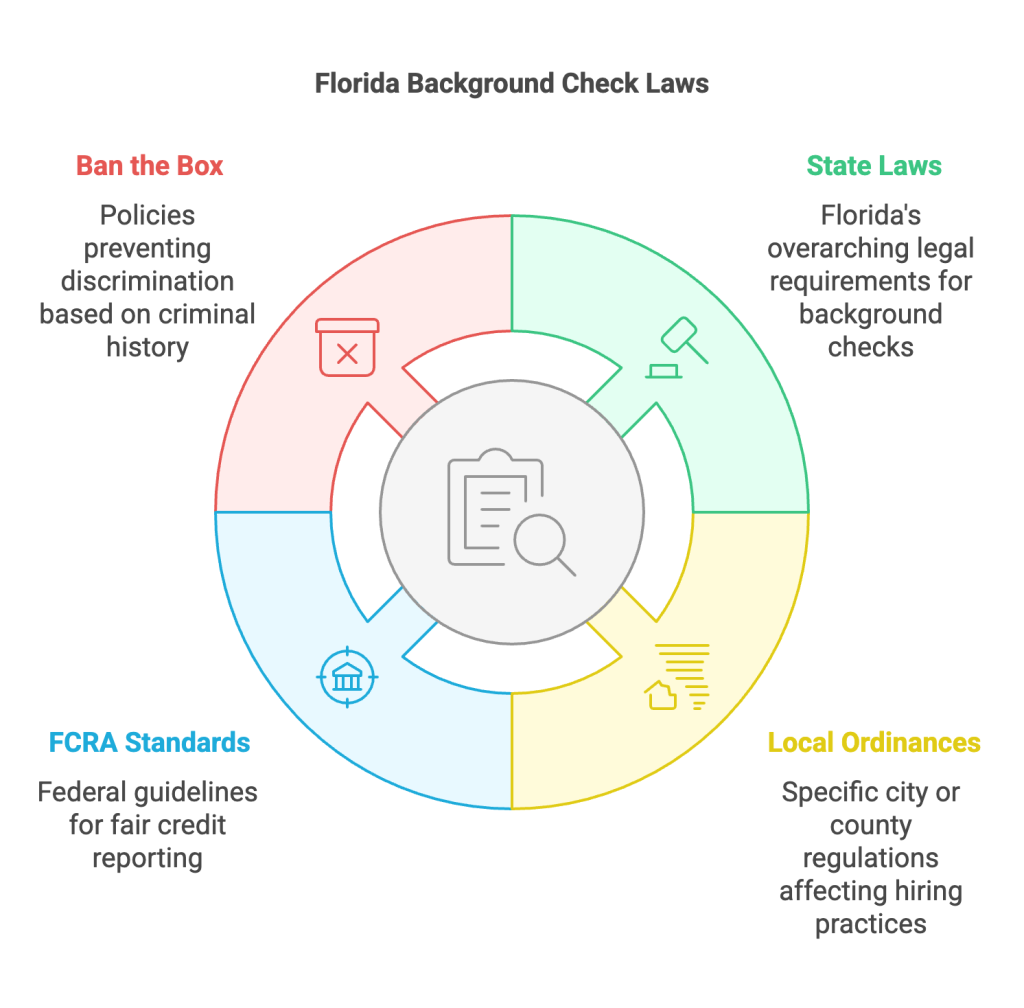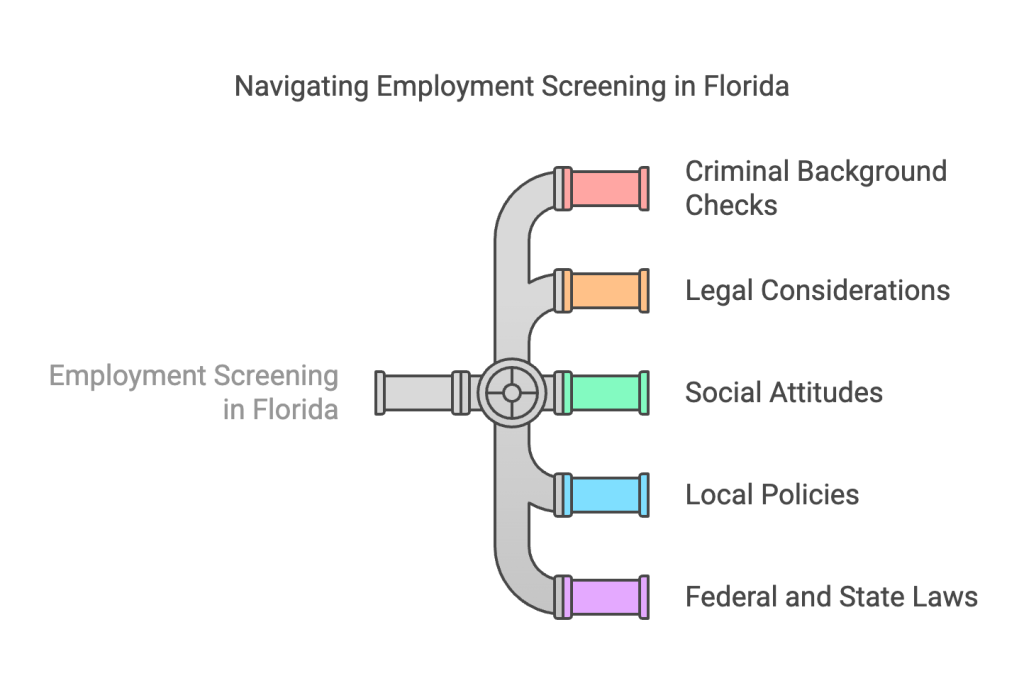Navigating the complex landscape of employment screening in Florida can be challenging due to the patchwork of laws that vary not only at the state level but also by city and county. Understanding these variations is crucial for both employers and job seekers to ensure compliance and fair practices.
In this comprehensive guide, we'll break down Florida background check laws, explore the nuances between different regions like Miami, Tampa, and Jacksonville, and offer data-driven insights to help you navigate the complexities of FCRA compliance and local hiring policies.
Key Takeaways
- Background checks in Florida are complex due to differing state and local laws, requiring a precise understanding for employers.
- The Fair Credit Reporting Act (FCRA) mandates employers to inform applicants and obtain consent before conducting background checks.
- Local ordinances, like Miami's "Ban the Box," restrict when criminal history can be queried during hiring.
- Employers must establish adaptable HR processes to comply with varying local hiring regulations effectively.
- Both employers and job seekers need to stay informed about their rights and responsibilities to avoid legal issues during the hiring process.
Introduction
Background checks play a critical role in the hiring process. They provide a snapshot of a candidate's past, helping employers make informed decisions. In Florida, this process is more intricate due to varying laws across cities and counties.
Imagine hiring someone in Miami without considering local laws—potential legal troubles await. Each region in Florida has its own tweaks to the rules. This necessitates a thorough understanding for businesses operating statewide.
Our focus will be on breaking down these local variations. We will delve into the legal frameworks that govern these checks and explore the implications for both employers and job seekers. A thoughtful approach to these complexities is crucial for compliance and effective HR practices.
This article aims to clarify the landscape of Florida's background check laws. We'll provide actionable insights to help you navigate these waters with confidence and accuracy.
Understanding Florida Background Check Laws
Florida offers a diverse legal landscape when it comes to background checks, influenced by both state-wide statutes and local ordinances. Knowing these variations can save you time and reduce legal risks, making your hiring process smoother.

State Overview
In Florida, employers must comply with a mix of state laws and the federal Fair Credit Reporting Act (FCRA). The FCRA sets the basic standards for how background checks are conducted, requiring employers to notify applicants and obtain written consent before initiating a check. Florida law enhances these requirements by prohibiting discrimination based on information gathered during the screening process, unless it directly impacts job duties.
Primary Legislation
Beyond the FCRA, Florida has specific laws addressing how criminal history and other personal data can be used in hiring decisions. Law 435.04 outlines screening requirements for employees working with vulnerable populations, often requiring Level 2 background checks which are more extensive. These laws protect applicants from unfair hiring practices but demand careful attention from employers to ensure compliance.
Local Nuances
Cities and counties in Florida have leeway to adjust aspects of background check laws to better address regional needs. Miami-Dade County, for example, includes "Ban the Box" ordinances to prevent prior criminal convictions from being a preliminary barrier to employment. Similarly, the cities of Tampa and Jacksonville have their own sets of rules that can influence hiring practices.
This mosaic of state and local laws means it's crucial to stay updated on both fronts. Ignorance here is no excuse, as penalties can lead to lawsuits and fines. Are you equipped to handle these complexities, or is it time to consult an expert? Always remember, careful navigation prevents costly missteps.
Employment Screening in Florida
Employment screening in Florida is a critical step in the hiring process. Different types of background checks are commonly used. Employers may look into criminal history, past employment, educational qualifications, and sometimes credit history, depending on the job role.
Criminal background checks are a primary focus. Employers are keen to know about any past criminal behavior that might affect job performance or workplace safety. For instance, a recent survey showed that over 70% of employers in Florida perform criminal checks as part of their hiring process.
Yet, there's more to consider than just criminal records. Social and legal attitudes towards background checks can differ greatly. In some regions, there is a push towards giving candidates a fair shot, even if they have a criminal past. This is seen in the growing "Ban the Box" movement, which advocates for delaying inquiries about criminal records until later in the hiring process. Florida hasn't implemented this statewide, but certain cities and counties have adopted similar policies.

The legal environment in Florida supports thorough background checks, but it's shaped by federal and state laws like the Fair Credit Reporting Act (FCRA). The FCRA dictates how background information can be gathered and used. It ensures candidates are informed if adverse actions, like denying employment, are based on their background checks, and it provides them an opportunity to dispute inaccuracies.
In summary, as an employer in Florida, it's crucial to handle background checks with care. Make sure your processes comply not only with state regulations but also respect local attitudes and legal requirements. Are your screening practices up-to-date and fair? These are questions every Florida employer should ask to ensure robust and compliant hiring practices.
Miami Hiring Laws: A Closer Look
Miami's hiring laws present unique challenges due to their local nature. This city has specific requirements that impact how employers conduct background checks. It's crucial for businesses to recognize and comply with these regulations to maintain lawful hiring practices.
Local Regulations
Miami enforces its specific hiring laws, which means you must be vigilant. For instance, the city has implemented "Ban the Box" legislation. This law restricts employers from inquiring about a candidate's criminal history during the initial application phase. It's only further along in the hiring process, usually post-interview, that such questions can be addressed. Not adhering to this rule could result in penalties and lawsuits.
Consider also Miami's cultural diversity, which can impact the process. Employers may need language-specific resources for effective communication during screenings. Neglecting cultural nuances might lead to misunderstandings or discrimination claims.
Challenges and Opportunities
The localized laws can initially feel burdensome. Adapting to these regulations may require altering standard hiring procedures, which can be time-consuming. Smaller businesses, in particular, might struggle without dedicated HR departments.
However, these challenges present opportunities. By aligning with Miami's laws, you signal to potential employees that you value fairness and inclusivity. This can enhance your company's reputation and attractiveness as an employer.
Practical Advice
To stay compliant in Miami, start by revising your job applications and interview processes. Remove any sections that prematurely inquire about criminal backgrounds. It's vital to update training for anyone involved in hiring to ensure everyone understands local legal requirements.
Engage with local HR experts. They can offer insights tailored to Miami's specific landscape and keep you informed on legislative updates. Utilizing automated systems for consistent application of these rules can also reduce human error.
Incorporating these practices will not only ensure compliance but also help create a more inclusive workplace.
Tampa Background Checks: Navigating Local Requirements
When you're dealing with background checks in Tampa, you need to know the local regulations. Understanding these specifics helps you avoid costly mistakes.
City-specific Considerations: Tampa has its own set of rules. Unlike some other areas in Florida, Tampa places particular emphasis on privacy. Employers must disclose to the applicant if they plan to run a background check and obtain written consent. Not doing so can lead to headaches down the line.
Common Missteps: Businesses often stumble by failing to provide clear notification before conducting checks. Another common pitfall is neglecting to consider the time limits for reporting certain information. For instance, arrest records older than seven years are generally off-limits unless the job pays over $75,000.
Actionable Takeaways: To comply with Tampa's background check requirements, start with a checklist. First, always get written consent. Next, familiarize yourself with the specific limits on what you can check, especially regarding older records. Lastly, provide candidates with copies of their reports if used in decision-making, and have a clear process for them to dispute inaccuracies.
These steps not only keep you compliant but also build trust with prospective employees. Remember, staying informed is your best defense against legal complications.
Jacksonville HR Compliance: Key Aspects
Jacksonville's HR compliance landscape can seem like a maze, but knowing local statutes simplifies the path. Understanding the specifics of city regulations helps you maintain compliant hiring practices.
Jacksonville requires adherence to both state and municipal rules, particularly regarding how you handle background checks. Local laws can dictate particular procedures or documents necessary for lawful checks.
Your HR strategies should align with Jacksonville's unique policies. Establish clear procedures for conducting background checks and ensure that all staff involved are well-trained on these protocols. Consistency and transparency in your processes help maintain compliance and build trust with candidates.
Legal challenges often arise from misinterpretations of the laws. Make sure your team is well-versed in local requirements and stay updated on any changes. Regular audits of your hiring practices can also identify areas for improvement.
Remember, the goal is not only legal adherence but supporting fair employment practices. By following best practices, you contribute to a fair hiring environment while minimizing risks for your organization.
Local Hiring Laws Across Florida
Different cities and counties in Florida have their own rules for hiring. This diversity requires employers to pay close attention to local requirements.
In Miami, for example, Ban the Box laws restrict employers from asking about criminal history on initial job applications. This promotes fair chance hiring by evaluating candidates' qualifications before considering their criminal records.
Contrast this with Hillsborough County, where there's greater flexibility in initial screenings but strict regulations on how criminal records can influence hiring decisions.
These variations have a real impact on businesses, especially those operating in multiple locations. Companies must establish adaptable HR processes to comply with each area's regulations.
Data shows compliance with local hiring laws can affect business operations. A study from the National Bureau of Economic Research found businesses that overlooked local regulations faced increased legal costs. They also saw higher turnover rates due to compliance issues.
By understanding and adapting to these local differences, employers can minimize risk and improve their hiring processes. Are your HR practices flexible enough to comply with the varied hiring laws across Florida?
FCRA Compliance in Florida
The Fair Credit Reporting Act (FCRA) is crucial for background checks. It sets the framework for how personal information can be collected and used by employers. In Florida, this federal law ensures both transparency and protection for job applicants.
FCRA compliance is more than a legal obligation. It’s about treating applicants fairly. Before obtaining a report, you need to inform the applicant and get their written consent. This upfront communication builds trust and transparency in your hiring process.
Consider this: you deny employment based on a report. The FCRA mandates you to provide the applicant with a copy of the report and an “adverse action” notice. This empowers candidates to dispute inaccurate or incomplete information.
For seamless compliance, maintain a checklist. Ensure your procedures align with FCRA requirements, from obtaining consent to handling disputes. Regularly reviewing your practices keeps you on the right track, especially as regulations evolve.
Ignoring FCRA guidelines can be costly. Businesses risk lawsuits and hefty fines. One misstep could damage your reputation. Staying compliant protects your organization and enhances your credibility.
How do you ensure you're following FCRA regulations in Florida? Periodically audit your procedures. Consider consulting with a legal expert to address any gaps or misconceptions. This proactive approach minimizes risk and strengthens your hiring practices.
Compliance is more than avoiding penalties. It’s about providing fair opportunities and safeguarding privacy. By adhering to FCRA regulations, you contribute to a more ethical and transparent job market in Florida.
Implications for Employers and Job Seekers
You’re navigating a maze when it comes to background checks in Florida. Both employers and job seekers must be informed to avoid costly missteps. Here's a breakdown of what each party needs to know.
Employer Responsibilities
For employers, compliance is a must. Knowing Florida’s laws and local requirements is your first step. Each city might have its own set of rules.
Hiring in multiple locations? You need a flexible but consistent policy across your operations. Consider working closely with legal experts who understand localities like Miami or Tampa. Staying updated with legal changes is crucial.
Example: An employer in Miami must follow the city’s specific ban-the-box regulations. Failure to comply can lead to fines and impede hiring processes.
Do you have a system in place for disputes? Employees can dispute information on their background checks. Ensure your HR team responds promptly and accurately.
Job Seekers' Rights
As a job seeker, you have rights, too. Florida law supports transparency in background checks. Know what's being checked and why. Employers must inform you and get your consent.
You’re entitled to see the report that a potential employer uses. If any information affects your job prospects, you can dispute it. This protects you from inaccuracies.
Think about leveraging this right. Knowing what’s on your record can save you from surprise. Correct errors before they become barriers in your job hunt.
Technological Dimensions
Technology is reshaping how background checks are done. For employers, technology offers streamlined processes and quicker results. Choose systems that help maintain compliance effortlessly with local laws.
As a job seeker, be aware that technology means faster results but also necessitates vigilance on accuracy. Tools are available for you to run your own checks, ensuring your record is as expected.
Ultimately, understanding these elements can make or break your employment process. Whether you’re hiring or being hired, staying informed is your best strategy.
Conclusion
Navigating Florida's background check laws requires thorough understanding and adaptability. From Miami’s distinct hiring regulations to Jacksonville’s compliance challenges, each region presents unique legal landscapes. Employers must stay informed about local statutes and incorporate them into their hiring practices to avoid pitfalls and ensure fair employment. This understanding facilitates a harmonious and equitable workplace, reflecting the importance of proactive engagement with these legal nuances. By aligning with both state-wide and city-specific laws, employers and job seekers alike can effectively manage the hiring process, fostering opportunities and compliance.
Frequently Asked Questions (FAQs)
What are the differences in background check laws between Miami and Tampa?
Miami and Tampa follow Florida state law for background checks. However, Miami may have additional local regulations due to its size and diversity. It's essential to check local ordinances for detailed requirements.Are background checks required for all jobs in Florida?
Not all jobs in Florida require background checks. Many employers conduct them to ensure workplace safety, especially in sensitive roles involving children or finance.
How do local background check regulations affect employers in Florida?
Local regulations may impose additional steps, such as waiting periods or special disclosures. This could influence hiring timelines and procedures.
What information can be excluded from a background check in Florida?
Arrests not leading to conviction and sealed or expunged records typically don't appear. Employers must adhere to the Fair Credit Reporting Act for additional limitations.
Can Florida counties have stricter background check requirements than the state?
Yes, counties can impose stricter requirements than state law. It's crucial for employers to stay informed about county-specific regulations.
How can job seekers prepare for background checks in different Florida cities?
Review your records to ensure accuracy. Be honest during interviews about potential issues. Research each city’s specific regulations to better understand what employers might find.
What is the Fair Credit Reporting Act, and how does it impact background checks?
The Fair Credit Reporting Act ensures fair and accurate reporting by requiring employers to obtain consent before running a check and to inform candidates of their rights.
How long does it typically take to complete a background check in Florida?
A typical background check can take anywhere from a few days to a week, depending on the level of detail required and the efficiency of local record systems.
Can employers in Florida use social media background checks?
Yes, but with caution. Employers should ensure they do not violate privacy laws and only consider information that is public and relevant to the job.
How can discrepancies in a background check be addressed?
If inaccuracies are found, contact the reporting agency to dispute the information. You should provide documentation to correct any errors quickly.
Definitions
Background Checks
Background checks verify a candidate's history, including criminal records, employment history, education, and credit reports, to determine their suitability for a position. Employers must follow legal protocols, such as obtaining consent and ensuring compliance with local, state, and federal laws like the Fair Credit Reporting Act (FCRA).
Fair Credit Reporting Act (FCRA)
The FCRA sets standards for how employers can collect and use personal information during background checks. It requires transparency, including notifying job applicants, obtaining written consent, and allowing disputes over inaccurate information. Non-compliance can result in legal consequences and damaged reputation.
Ban the Box
"Ban the Box" policies delay questions about an applicant's criminal history until later stages of the hiring process. These laws aim to provide fair chances to individuals with a criminal background by focusing first on qualifications rather than past offenses. Some Florida cities, like Miami, have enacted these regulations.
Level 2 Background Checks
A Level 2 background check is a more detailed screening required for positions involving vulnerable populations, such as healthcare or childcare workers. It includes fingerprinting and reviews of federal and state criminal databases. Employers must comply with Florida's strict guidelines for using this information in hiring decisions.
Adverse Action Notice
An adverse action notice is a document employers must provide to candidates if a job offer is denied based on background check findings. It includes a copy of the report and an explanation, allowing applicants the opportunity to dispute any inaccuracies, as required by FCRA regulations.

GCheck Editorial Team
Meet the GCheck Editorial Team, your trusted source for insightful and up-to-date information in the world of employment background checks. Committed to delivering the latest trends, best practices, and industry insights, our team is dedicated to keeping you informed.
With a passion for ensuring accuracy, compliance, and efficiency in background screening, we are your go-to experts in the field. Stay tuned for our comprehensive articles, guides, and analysis, designed to empower businesses and individuals with the knowledge they need to make informed decisions.
At GCheck, we're here to guide you through the complexities of background checks, every step of the way.





